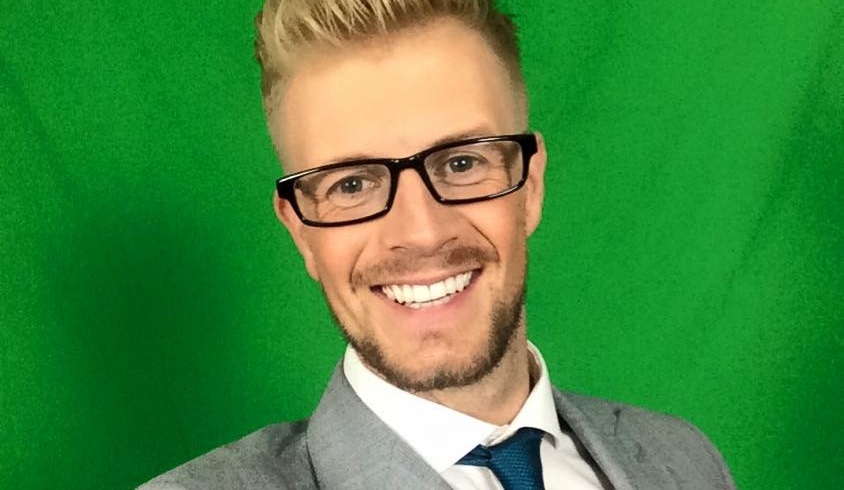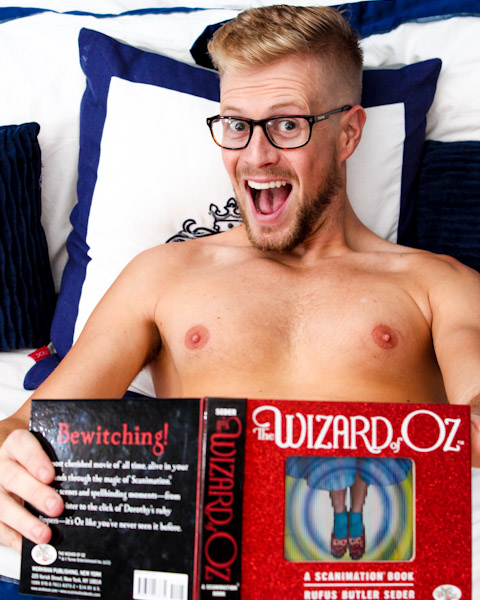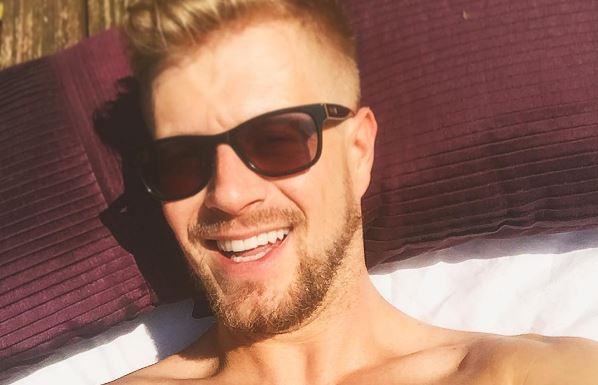Mr Gay Wales on life as the contest’s first ever winner with a physical disability

Mr. Gay Wales crowned a winner last week, and that winner was none other than 32 year-old journalist, Paul Davies.
Ecstatic, fiery and an advocate for social justice, Davies is the first ever disabled delegate in the history of the Mr. Gay competition, and disarmingly honest about his disability, even proudly owning the nickname ‘Stumpy’.
The “Rhondda Valleys boy” and Pinksixty News presenter sat down with Attitude’s Andrew Headspeath to discuss his win, his disability and how his eyes are set on the Mr. Gay Europe prize.
So what’s the life of Mr. Gay Wales like?
I’ll be really honest, it’s been really overwhelming in the amount of people that you get asking you questions on Twitter and Facebook, and it’s amazing. Really, really good but all of a sudden you go from nobody to somebody, where people feel like they can offload on you. It’s really lush, absolutely lush but very daunting as well.
Do you think you can get used to it?
Yeah. I was like, ‘Oh my gosh I’m only a valleys boy’. It’s crazy, it’s good stuff. I work in marketing for a large holiday resort, and also I’m a marketer, journalist and news anchor for LGBT channel Pinksixty news. I’m very busy, I like to fill all my time, and as you can tell it’s even more filled now! I don’t even have five minutes to myself. But it’s good, all fantastic.
How did you find being young and gay growing up in a small town?
This is a deep one, where do I start? I was there up until the age of 18 and then I became part of the first ever 100 redcoats at Butlins, and I moved away. For my past in the Rhondda Valleys, I grew up on a council estate, like most people probably would have back then. It was a very close community like most working class families are on a council estate, so everybody was very inclusive, everybody knew everybody. Those are the elements I love and have made me who I am – hence why I’m such a nosey bugger. I love speaking to people, and understanding how they work and their history.
But growing up in the Valleys, unfortunately there was a lot of people I was aware of who had a lot of problems for being gay. Generally the rule of thumb back in the day was that if you were gay, you moved away. You wouldn’t stay in the Rhondda Valleys. A number of people had gotten bullied for being gay.

A friend of mine unfortunately had committed suicide as well. He was bullied very, very badly for coming out as gay when he was 16. From my personal experiences, it was more just watching other people being bullied which was horrible because when you look at myself with my hand and everything, generally I would be a natural target. But because I was generally a bit more of an extrovert people found it hard to get to me. I mean it would get to me, some people would say a few comments when I was younger.
I had a teacher who really affected me a lot. She was very against me and my hand. In fact, she even told me I should stop bothering with work because I’m never going to get anywhere in life. I was about 13/14, a really impressionable age. If I wasn’t as headstrong as I was that could have really got to me, but instead I knew that was a motivation to get me through and just think, ‘You cow, how dare you say that.’ It really affected my friend as well, he was really gutted. He was an extremely intelligent, intellectual boy, but the teacher just said to him, ‘You need to stop hanging around with Paul, you need to understand he’s not going to get anywhere in life because of his hand’. It was a fabulous school but it did have this number of teachers (who are not there anymore) who just had this archaic belief in their head that I was different and wouldn’t achieve and wouldn’t go anywhere.
Being gay though I was very lucky because proving people wrong about my stump was the challenge of things, but when I came out as gay the community was very accepting. Unfortunately I saw the people get bullied and that was horrible.
Do you ever face have problems with your disability from the gay community itself?
I was constantly on a task to prove people wrong when it came to my hand – or my ‘stump’ as I call it. That’s what you can call it – this is what I want to do. It is a stump and if I can make people relax with humour then I will do that, my nickame is ‘Stumpy!’.
But in the LGBT community itself, when I was very young and I first went out to a gay bar, that was very hard, that was very strange. Because people have these preconceived notions of you as a ‘chicken’, as we used to call them back then, first timers on the gay scene. And then obviously my hand as well. I felt as if I were starting over again.
When you’re in the Valleys everybody knows you. Everybody knows your history, your past, your family, yes you are Paul with one hand, you know what I mean, and then all of a sudden you’re starting fresh – you go out onto the scene and all of a sudden you feel like everybody’s judging you and you’re back at square one again. That was a weird time for me. Sometimes even now when I go out onto a new scene I feel as if I’m starting again and think, ‘Oh god, here come the questions’, people automatically label me that I can’t do this or that, and I have to go through the whole stage of proving them wrong again. But now I realise that’s just a lack of education and people need to open their eyes a little bit.
Now that you’re the first man with a physical disability to win a Mr. Gay competition, will you be using your position to address these issues?I will make a difference, without a doubt.
That is literally my whole thing. I believe that I can make a difference. I don’t want to become too preachy but I just want people to understand that within the LGBT community we’re slowly fracturing, we’re all fighting against each other. There’s so many minority groups there that need to all club together. I see people being oppressed within our own community who are disabled or racially different, and we’re fracturing our own communities. We’re making ourselves even more of a minority group because we’re breaking up even more. And like, ‘Whoa hang on guys, this is wrong’, we need to be working together, we need to be inclusive, otherwise we’re no better – we’re losing the fight that we’re fighting.
I want to give some inspiration to people with visible disabilities and say, ‘Look, you can do it. You can do this, you can make a difference. Don’t hide away, don’t put your hand in your pocket because you feel somebody’s gonna judge you – show it. Be proud of who you are’. That’s the same thing with sexuality, that’s what it’s all about. For me, I’m a man who happens to like men and I also have one hand [laughs]. I’m blonde and Welsh. There you go, there’s loads of minorities there. It’s about saying hold on guys, we’re fighting for these rights, especially in Britain where we’re very liberal, we’ve got so much now but in a way we’re fighting against each other. Why don’t we all stick together? I want to open people’s eyes a lot more and stop stereotyping and challenge things but at the same time make people come together, to get more united again.
And did that form part of your reason to enter the competition? What were your reasons to enter the competition in the first place?
Last year, when I joined PinkSixtyNews, I was getting more involved with the gay community and started to understand more about it. I’ll be honest with you, as much as free and open as I am, I don’t think I understood what was in our communities and what was going on in the world. Not just in the UK and Ireland, but across the world. It was an international channel I started reading all these stories. When I did PinkSixty it did make a difference to some individuals in America and Mississippi because I was reporting on their stories. When I got an email back I thought, ‘Oh my god, this is crazy, you really are making a difference on a global side’.
Then I thought, well hang on. There’s also a fight to be fought in our own country. When I saw the Mr. Gay Europe, I liked what it stood for. I wasn’t about aesthetics, I mean there’s an aesthetic element to it, but it’s more about the brains and fighting for gay rights and the LGBTI community. And I thought, you know what, I think things need to change a little bit and I need to put myself forward for this. And a couple of months later, here we are!

So what did you have to go through to get this title?
I entered online. Basically, you submit your images and then you submit a bio on yourself on why you should be Mr. Gay Wales or Mr. Gay England or Scotland or wherever you’re applying from and then from there they have to do the application process. I don’t know too much about it as I’ve just got the title and want to find out more of what the process was but at the moment that’s where we’re at.
But moving forward with it to Mr Gay Europe, obviously I’m going to be flying away, I have to apply for sponsorship and all this kind of stuff. There’s a big campaign now as well going towards the final judging decision to who’s going to be Mr. Gay Europe. There will be a sporting competition, there will be (which I’m dreading) a swimwear element to it, then there’s the theory behind it – questions on LGBT rights, a whole sort of brain element involved as well so it’s not just about brawn it’s about brain. And then obviously people give you questions and photoshoots to finish things off, so it’s a mixture of both: you can have the brawn thing and the brain thing to back it up and vice versa. So we’ll see how I fare with that!
Some people may think of Mr. Gay competitions as shallow and ‘all about looks’. What would you say to those criticisms?
Well as that preconception – I’m in it! That’s a big difference isn’t it? [laughs] So for whatever reason that’s hopefully breaking stereotypes, and I will find out. And I want to find out what makes this competition tick. I wanted to challenge it as well and say, ‘Okay let’s see if this really can be challenged’, if we can change people’s perceptions about it and see if it really is about aesthetics or not.

Looking to the future, how does it feel?
At the moment, seriously, I’m completely up in the air. Really overwhelming, but it’s exciting. I’ve got a chance to make a difference. And just to know that I’ve made a difference within history as the first disabled Mr. Gay has been absolutely fantastic. I feel like I’ve made my mum proud, my family proud – which they are extremely proud and it’s been quite good with my dad who didn’t understand being gay but literally when I told him this he was like ‘Oh my god, it’s absolutely fab’. Again, it’s just the pride that I have, in myself as well as people’s belief in me to make a difference. People I’ve never spoken to have come up to me and said ‘Oh my god, this is amazing, you can make a difference’. So knowing I can make a difference to one person but also to people within our community as well, I’m literally going to make the most of every second.
That’s what I want to do. I want to get people involved, I want them to see my journey, I want them to see my ups, my downs. I want them to see my competition journey; I’ll be putting up vlogs, they can follow me on Facebook and Twitter. Like the hastag #nofilter, this is reality, this is real. That’s what I want to do. I don’t want to be fake in any way, I’m not fake, I’m me. That’s kind of my motto, I tell people, ‘Never stop being you if this is what you are then that’s it, fab’. People should just accept you for what you are.
Voting for Mr. Gay Europe begins July 1st.
Follow Paul Davies on Twitter at @paul_stumpy or like him on Facebook.
More stories:
Beyoncé just got bigger… with her own day
Watch Miley Cyrus’ gender defying performance on NBC’s Maya & Marty
